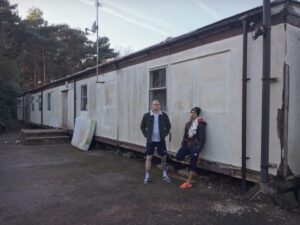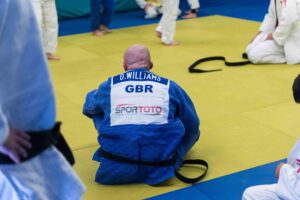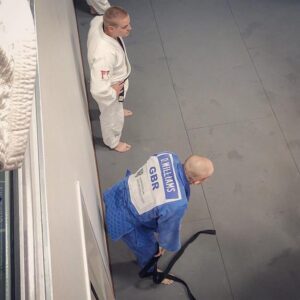
I’ve never been heavily involved in another sport. Regularly training and competing in Judo pretty much since starting in early 1994. It was from that, somewhat ignorant standpoint, that my expectations of what athletes from other sports are willing to put themselves through in attempt to succeed, were once built upon.
Full time training for Judo has taken place in someway shape or form since the 1970’s. It still amazes me that Eddie the Eagle has such notoriety in this country. Not that his commitments and effort weren’t impressive but, honestly, there have been hundreds of Judo players that have had to beg, steal and borrow and go to further lengths in order to train full time over the decades. There are SO many stories of Judoka having to steal milk bottles off doorsteps, sharing beds, living in Judo clubs, hiding in train toilets and hitchhiking to training, blagging dole officers and, living on pittance for years on end.
When I was a junior athlete it was pretty well accepted that if you wanted to go on and be a successful international senior fighter then you would have to, for a good few years at least, commit to full time training. As a maturer senior I think that to be the case more now than ever; I’ve never seen a successful senior player that didn’t train full time. It’s a must. More countries compete in Judo than any other sport in the Olympic games. In many of those countries Judoka are treated and supported like professional athletes. Regarding the expectation for full time training, what I’ve come to understand however, is that that is not the case for all Olympic sports in Britain. In fact, very few demand that their athletes are full time to the level of absolute commitment that Judo players are. To summarise, Judo players have to train like professional athletes yet most, unless they are at the very pinnacle of the game, don’t receive any stable financial support.

A good friend of mine, that has been a full time support coach to a number of different Olympic and professional sports within Great Britain at the highest levels for nearly 20 years, has said to me before that, Judo, in terms of what commitment is expected of the athletes, has been well ahead of other sports for a long time. Plenty of sports that we have had a lot of global success in too.
From my own experience of meeting many athletes and coaches from other sports that is the impression that has been built up in my mind now also. From a British perspective I am yet to encounter a sport that demands so much of its athletes and yet provides, in comparisons with other sports, little in terms of attaining financial security post competitive career. John Buchanan, one of only five British men to win a World Championship medal since the break up of the Soviet Union, highlights this when he talks about retiring from full time Judo and leaving with everything he owned in two bin bags.
This isn’t intended to be a post ‘moaning’ about the poor old skint full time Judo players. Personally I’ve loved the majority of my time as a full time player, which has included so many positive life changing experiences. This is more a reflection on my accumulated knowledge of Judo and other sports and, after the lockdown periods which, for me, have included some other work and increased earnings. I now feel I can look at it all a bit more neutrally. The more I view it from a bit of distance I can see just how unusual it is. How much is expected of British Judo players. And a lot of coaches for that matter.

I am one of a handful of British players of my generation that has continued training and competing into their thirties. Most generations are similar in that aspect. While I have been a full time player there have been plenty of people that have come and gone; although it is embracing an unusual lifestyle there are a good number of individuals that try and/or commit to full time training for at least a few years. I suppose Judo is just one of those sports that can really capture and grab hold of someone.
For the first eight and a half years of being a full-time athlete at Camberley Judo Club I lived in the Judo club itself. For the first four years of that time in a bunk bed. After a year of being full time I received UK Sport funding (like a small wage) of seven thousand pounds per year, which I was on for 2.5 years in total. I spent my savings in my first year of full time training. I gave up a relatively decent job in construction to move to Camberley. Relocated away from my family. Trained hard three times a day. Slept on plenty of floors in order to get out to training camps. Starved and dehydrated myself countless times to make weight. Had periods on the dole. Took part time night work where I could. Snuck into meals on international training camps that I’d snuck onto. And I have been just one of probably 25 or so full time players at Camberley at any time, all with simlar-ish experiences. Camberley being one of four to five places offering full-time training across the country. It’s not just a mere few that commit to it.

I have been reading Mark Law’s brilliant The Pyjama Game recently. The first chapter reminded me of conversations that I’ve had with my friend, Otty, an ex Hungarian International fighter, who’s sons and wife train with us at Camberley. Otty always pressed me to write more about full time Judo and to be active online. He always said that Judo people that train full time are one percent of the Judo community. It’s not the rest of that one percent that will be interested in the content, but the other bloody ninety-nine percent that should be targeted! When Otty laid it out simply like that it rang home. Most competitive Judo people start when they are young, they don’t really know life without it. I think what that does is often masks to them just how special and different their experiences really are, how interesting they can be to others that haven’t been on that same journey. That is further hidden from them as the majority of Judo people that most full time players spend their time with is other full time fighters; what they may have to say isn’t anything out of the ordinary to those that are having similar experiences, so they perceive it to be relatively uninteresting. I then also feel that because the demands of the full time training are so harsh the time and energy to document those experiences is seldom there. Then, as previously discussed, nearly all full time Judoka have to earn money after competing, following living a very frugal lifestyle as an athlete. Most throw themselves hard into working careers after and, there again, I believe the time or energy for those experiences to be captured is rarely there. Finally, I think that because such methods and sacrifices are just virtually accepted in the Judo circles, that many may be put off detailing things through a fear of appearing like they may be ‘moaning’ or ‘complaining’.

Thinking on all that, particularly over the last 12 months of lockdowns, these following lines from that first chapter of The Pyjama Game really stood out:
I soon understood (after starting Judo at nearly 50 years of age) that not only did the rest of the sporting world know little of the realities of the Judo (competition) circuit, but many who practised at the club didn’t have much idea either…..
Although there was a welter of literature on the techniques of Judo, I was surprised that little else had been written. Here was an untold story of unsung heroes. And it was one which I realised could only be written by a Judoka; moreover, the people who were the best qualified to tell this story had never got round to it.
In my time I have read plenty of sporting biographies and watched many documentaries of sporting struggles and successes. Honestly though, aside from the odd exception, I often think well, I know of 20-30 Judo players with more impressive stories of sacrifice and struggle than that. Whether they were champions or one of the majority of full time players that commit but don’t obtain global success, they all have amazingly interesting stories. As a younger player I used to love listening to all the stories from older or retired fighters; from places like Wolverhampton, The Edinburgh Club, Kendal, The Budokwai, Coventry etc. Then when I moved to Camberley Judo Club, the longest running full time centre in British Judo’s history, where there were volumes of brilliant tales from past and present full time players regularly told.
I feel I could write a fairly large book were I to document all my own interesting experiences in Judo. I feel even more strongly that were someone to document all the inspiring and funny tales that I’ve heard from others over the years, they could fill a small library.
Sign up to get my FREE weekly newsletter, Judo’s Weekly Weigh In. Including an early release of these articles!

